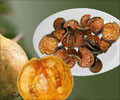A new study has revealed that a lack of antioxidants may leave you extremely tired.
A new study has revealed that a lack of antioxidants may leave you extremely tired.
The study was conducted on male three-spined stickleback fish (Gasterosteus aculeatus) and it showed that antioxidants influence their behaviour– a finding that might be useful for humans as well.During the study, researchers found that such fish fed on a high-antioxidant diet spend more time and energy fanning oxygen-rich water onto the eggs in their nest.
They said that the results aren’t entirely surprising, as an indirect link between diet, well-being and behaviour makes sense.
“I would expect to see some behavioural changes from antioxidants through effects on body condition or immunocompetence. But this study suggests a direct pathway, which is interesting,” Nature quoted Ulrika Candolin, an ecologist at the University of Helsinki in Finland, as saying.
She found that lack of antioxidants seems to make the fish’s muscles tire more readily.
She also thinks it is likely that behavioural changes would be seen in other animals deprived of antioxidants. However, whether these changes are the result of fatigue or deteriorating health would require further study.
Advertisement
They give zebra finches their orange beaks, blue tits their yellow feathers and sticklebacks their red bellies. All these characteristics are used to attract mates. Without carotenoids, the animals lose their colour and so will fail to impress potential partners.
Advertisement
For the study, Pike and his colleagues placed 40 male sticklebacks in individual aquaria and fed them fish food containing either 10 or 200 micrograms of carotenoids per gram of fish food – within the normal range that they would get in the wild — over six months.
The researchers then placed gravid females in with the males, allowed them to spawn, and then removed them again. The males initiated their standard behaviour of fanning their eggs with their pectoral fins, an activity that oxygenates the eggs and improves offspring survival, particularly in hypoxic waters.
They then watched how fish on different diets responded when oxygen levels in the water were reduced to 30 percent of normal.
It was found that sticklebacks on high-antioxidant diets increased their fanning from 49 percent of the time to 82 percent of the time, whereas sticklebacks fed low-antioxidant diets did not increase their fanning activities.
“What really surprised us was that there was a behavioural response to a lack of carotenoids. The fish were otherwise completely healthy, so we think the absence of carotenoid antioxidants caused muscle fatigue in the fish from strenuous exercise,” Pike said.
In case of humans, despite the large volumes of work being done on the effects of antioxidants on our bodies, Pike pointed out that there has been very little research on antioxidants and behaviour.
However, he assumes that it might have a similar effect.
“While I don’t think consuming lots of antioxidants is necessarily going to add a spring to your step, not getting enough could take your spring away,” he said.
The study is published in Behavioural Ecology 1.
Source-ANI
SRM/C











